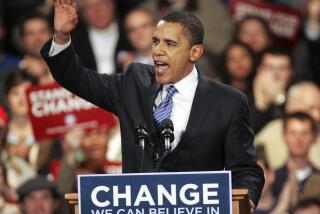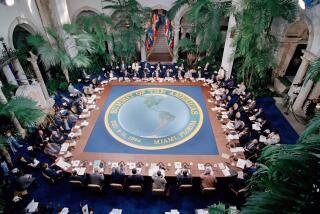Summit Results Could Give Lift to Democrats
- Share via
WASHINGTON — The collapse of the Iceland summit deprived the Republicans of an advantage they had hoped to use in the climactic days of the congressional campaign--and gave Democrats reason to hope that the public disappointment over President Reagan’s encounter with Soviet leader Mikhail S. Gorbachev would give their candidates a boost.
GOP strategists had reasoned that Reagan’s ability to help their candidates would be increased by his reaching some sort of accord with the Soviets. This extra margin would have taken on particular significance in several hard-fought races that will decide which party controls the Senate in 1987.
“The trend in the Senate races has been slightly in favor of the Democrats,” said Larry Sabato, University of Virginia political scientist. “The Republicans needed a boost, and they didn’t get it.”
Even Republicans conceded that they had lost an opportunity, but some also argued that they had lost nothing more than that and were thus no worse off than before the Iceland talks appeared on the political horizon.
Loss of Good Will Seen
“We said beforehand that the worst we could do was a wash,” said David Narsavage, spokesman for the Republican Senate Campaign Committee. “And that’s what happened.”
Yet some Democrats contend that the GOP has lost more than just an opportunity. They argue that Republicans have also lost some of the good will that the popular President would ordinarily bring with him as he stumps around the country.
“I think this probably severs his coattails once and for all,” said Democratic pollster Harrison Hickman, who is involved in three hard-fought Senate races. “He’ll be on the defensive for the next three weeks.”
Democratic media consultant Robert Squier agreed. “They were looking for a quick fix and got an October surprise,” he said, describing the Administration’s summit planners. “They were playing the expectations game, and they lost.”
A successful summit, as Republican strategists envisioned it, would have tended to make voters feel better about themselves and the country--a mood that usually works to the advantage of incumbents. Also, it would have turned public attention toward the high drama of international arms negotiations and away from the prosaic issues on which Democrats have been campaigning as they seek to unseat GOP members of the House and Senate.
Mixed Reviews
“What this does,” Democratic pollster William Hamilton said, “is deprive the Republicans of the chance to nationalize the election around Reagan’s popularity and . . . allow us to keep focusing on the domestic issues and local grievances.”
Not all Democrats agree. Sen. George J. Mitchell of Maine, chairman of the Democratic Senate Campaign Committee, who had said before the Iceland meeting that it would not significantly affect the election, stuck to his guns after the meeting collapsed.
“We continue to believe the 1986 election will not turn on any single issue but will be determined by the local issues in each of the 34 Senate race states,” he said.
And some Republicans went so far as to suggest that, ultimately, the episode might do the President and their candidates some good. Narsavage said that, by refusing to make any concession to Gorbachev on the Strategic Defense Initiative, the President was steadfastly sticking to a position he has taken all along.
“We still might derive some benefit from his being perceived as a man who has kept his word,” Narsavage said.
Kennedy Case Cited
David Keene, a GOP consultant and chairman of the American Conservative Union, said that Republicans also might benefit from the traditional public tendency to rally around the President in times of international trouble, even when the President might have brought some of the trouble on himself.
Thus, President John F. Kennedy’s rating in public opinion polls soared after the abortive invasion at the Bay of Pigs by CIA-backed Cuban exiles in 1961. “The worse I do, the more popular I get,” Kennedy said at the time.
But Democratic pollster Hamilton said that such reactions are limited to what the public perceives to be dangerous situations. Reagan would not benefit from the events in Iceland, Hamilton contended, because Americans do not feel threatened by Gorbachev.
“Gorbachev is not seen as a dragon,” Hamilton said. “He did not take off his shoe and bang the table.”
More to Read
Get the L.A. Times Politics newsletter
Deeply reported insights into legislation, politics and policy from Sacramento, Washington and beyond. In your inbox twice per week.
You may occasionally receive promotional content from the Los Angeles Times.










